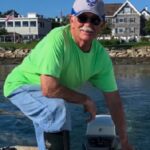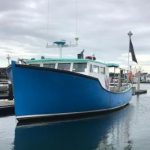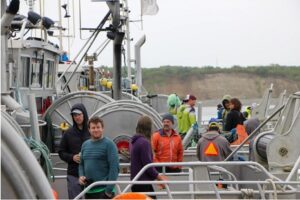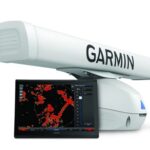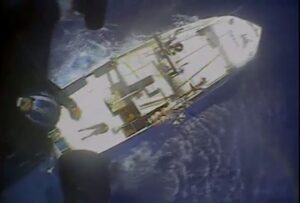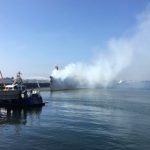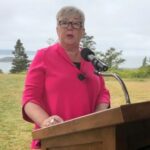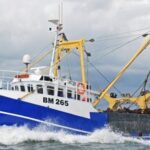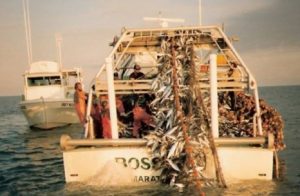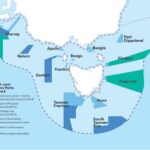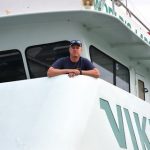Daily Archives: April 21, 2016
East End fishermen gather, demand changes to state enforcement laws
 East End commercial fishing advocates gathered at an Amagansett fishing family’s home Thursday to demand a change to state law that allows enforcement officers the “unfettered” ability to seize and sell fish taken in enforcement actions. The request follows years of charges by several East End fishermen that state enforcement officers seized fish then sold it without any procedure for those charged to reclaim their property once they were later acquitted. Since the practice has come under criticism, the state has returned more than $10,000 to fishermen who were acquitted of charges. Among them were the Lester family, whose members in 2013 received a check for $202.25 for seized fish after they were acquitted of illegal fish possession. Read the rest here 20:09
East End commercial fishing advocates gathered at an Amagansett fishing family’s home Thursday to demand a change to state law that allows enforcement officers the “unfettered” ability to seize and sell fish taken in enforcement actions. The request follows years of charges by several East End fishermen that state enforcement officers seized fish then sold it without any procedure for those charged to reclaim their property once they were later acquitted. Since the practice has come under criticism, the state has returned more than $10,000 to fishermen who were acquitted of charges. Among them were the Lester family, whose members in 2013 received a check for $202.25 for seized fish after they were acquitted of illegal fish possession. Read the rest here 20:09
Pillar Point Fish buyer must move hoist
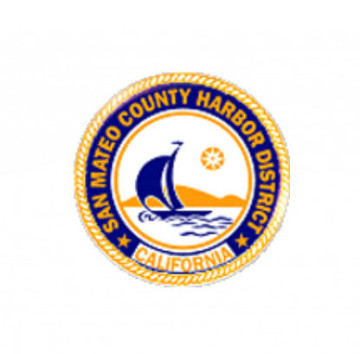 A fish buyer at Pillar Point has been ordered to remove a hoist at Johnson Pier installed in 2014 that critics said skirted coastal laws. Steve McGrath, the general manager at the San Mateo County Harbor District, sent a letter to Three Captains Sea Products last week ordering the company to remove the hoist by May 12. The hoist has been the center of considerable controversy as the company’s owner Larry Fortado filed a civil complaint against the district alleging Commissioner Sabrina Brennan worked on behalf of his competitors to keep him from using the hoist. Read the rest here 19:37
A fish buyer at Pillar Point has been ordered to remove a hoist at Johnson Pier installed in 2014 that critics said skirted coastal laws. Steve McGrath, the general manager at the San Mateo County Harbor District, sent a letter to Three Captains Sea Products last week ordering the company to remove the hoist by May 12. The hoist has been the center of considerable controversy as the company’s owner Larry Fortado filed a civil complaint against the district alleging Commissioner Sabrina Brennan worked on behalf of his competitors to keep him from using the hoist. Read the rest here 19:37
COMMENTARY: 40 years after Magnuson-Stevens, not all promises kept
 The Magnuson-Stevens Fishery Conservation and Management Act turned 40 last week and federal and state fishery managers marked that event with an opinion piece in the Alaska Dispatch News on April 12 extolling the successes of the Magnuson-Stevens Act and its implementation in Alaska as a “global model of sustainability.” As the authors point out, the Magnuson-Stevens Act sets up a “transparent governing process” intended to ensure that “science is behind every fishery management decision” in Alaska. Indeed, the Magnuson-Stevens Act sets up national standards ensuring that all fisheries are managed to achieve “optimum yield from each fishery” with management decisions “based on the best scientific information available,” and guided by carefully considered fishery management plans. BUT,,, Read the rest here 16:31
The Magnuson-Stevens Fishery Conservation and Management Act turned 40 last week and federal and state fishery managers marked that event with an opinion piece in the Alaska Dispatch News on April 12 extolling the successes of the Magnuson-Stevens Act and its implementation in Alaska as a “global model of sustainability.” As the authors point out, the Magnuson-Stevens Act sets up a “transparent governing process” intended to ensure that “science is behind every fishery management decision” in Alaska. Indeed, the Magnuson-Stevens Act sets up national standards ensuring that all fisheries are managed to achieve “optimum yield from each fishery” with management decisions “based on the best scientific information available,” and guided by carefully considered fishery management plans. BUT,,, Read the rest here 16:31
Togiak herring harvested after surprisingly early opener – roe yield sampled at 15 percent!
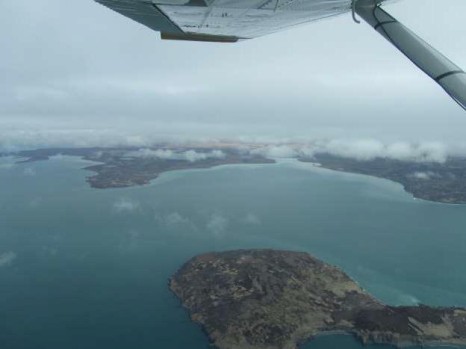 The first commercial harvest of Togiak herring this season was reported Tuesday. The season started much sooner than expected, and the processors and the fleet have been struggling to get on the grounds since commercial effort was opened Sunday evening. “One company did manage to buy some fish,” said area management biologist Tim Sands Wednesday morning. “We’re still getting reports that it’s too windy in most places to fish, and turbid enough that it’s hard to even see fish. I think other companies are there, and ready to go.” When two companies or less are buying, the Dept. of Fish and Game keeps the details of the harvest confidential. Unofficially, word from the grounds is that the herring caught were big, and the roe yield surprisingly high, perhaps 15 percent. Sands said he had heard the same. Audio, Read the rest here 14:33
The first commercial harvest of Togiak herring this season was reported Tuesday. The season started much sooner than expected, and the processors and the fleet have been struggling to get on the grounds since commercial effort was opened Sunday evening. “One company did manage to buy some fish,” said area management biologist Tim Sands Wednesday morning. “We’re still getting reports that it’s too windy in most places to fish, and turbid enough that it’s hard to even see fish. I think other companies are there, and ready to go.” When two companies or less are buying, the Dept. of Fish and Game keeps the details of the harvest confidential. Unofficially, word from the grounds is that the herring caught were big, and the roe yield surprisingly high, perhaps 15 percent. Sands said he had heard the same. Audio, Read the rest here 14:33
Newfoundland cod stock shows signs of recovery
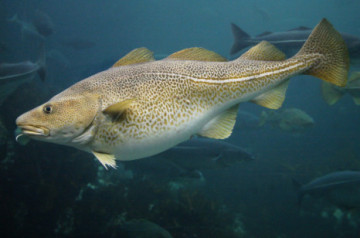 The Newfoundland northern cod stock has grown significantly since 2006, according to an independent assessment completed by SAI Global on behalf of WWF-Canada and the Fish, Food and Allied Workers Union (FFAW-Unifor). The assessment cautions, however, that numbers are far below what they were during the peak commercial success of the fishery. FFAW-Unifor, the Seafood Producers of Newfoundland and Labrador, Fogo Island Co-op and WWF-Canada agreed to work together to rebuild the fishery off Newfoundland’s northeast coast, also referred to as area 2J3KL, through a Fisheries Improvement Project (FIP) in 2015. Read the rest here 14:17
The Newfoundland northern cod stock has grown significantly since 2006, according to an independent assessment completed by SAI Global on behalf of WWF-Canada and the Fish, Food and Allied Workers Union (FFAW-Unifor). The assessment cautions, however, that numbers are far below what they were during the peak commercial success of the fishery. FFAW-Unifor, the Seafood Producers of Newfoundland and Labrador, Fogo Island Co-op and WWF-Canada agreed to work together to rebuild the fishery off Newfoundland’s northeast coast, also referred to as area 2J3KL, through a Fisheries Improvement Project (FIP) in 2015. Read the rest here 14:17
NT coroner says Austral Fisheries should be prosecuted for fisherman’s death at sea
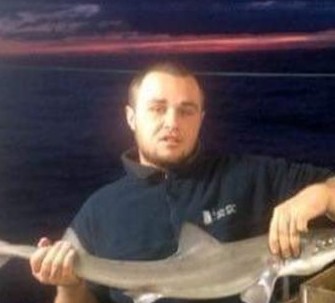 The Northern Territory coroner has told an inquest into a fatal electrocution on a prawn trawler that Austral Fisheries should be prosecuted for providing an unsafe workplace. Coroner Greg Cavanagh made the comment while the company’s chief executive David Carter was giving evidence about his knowledge of. Ryan Donoghue, 20, was using a 240-volt angle grinder, plugged into a socket without a safety switch, to cut rusted shackles on the company’s Newfish 1 trawler in 2013. Mr Donoghue had bare feet when a wave hit him and the trawler’s crew members were unable to revive him with CPR. “This workplace was unsafe,” Mr Cavanagh said. “I reckon that your workplace should be prosecuted for it, but no-one’s going to do it.” Video, Read the rest here 11:52
The Northern Territory coroner has told an inquest into a fatal electrocution on a prawn trawler that Austral Fisheries should be prosecuted for providing an unsafe workplace. Coroner Greg Cavanagh made the comment while the company’s chief executive David Carter was giving evidence about his knowledge of. Ryan Donoghue, 20, was using a 240-volt angle grinder, plugged into a socket without a safety switch, to cut rusted shackles on the company’s Newfish 1 trawler in 2013. Mr Donoghue had bare feet when a wave hit him and the trawler’s crew members were unable to revive him with CPR. “This workplace was unsafe,” Mr Cavanagh said. “I reckon that your workplace should be prosecuted for it, but no-one’s going to do it.” Video, Read the rest here 11:52
Commercial Fisherman in mutilated crab case found not guilty
 Judge Thomas Nave found commercial fisherman Charles Blattner, 47, not guilty of the fishing violation that an Alaska Wildlife Trooper cited Blattner for on Feb. 6. According to a trooper dispatch report, Trooper Scott Bjork found Blattner on board a vessel in Gastineau Channel with 11 Tanner crab disfigured in a way that allegedly prevented the trooper from determining their true size. Blattner appeared in court March 4 to pay the citation, according to court notes. After discussing the matter and making it clear he disagreed with the trooper’s findings, Blattner decided to take his case to trial. Read the rest here 10:07
Judge Thomas Nave found commercial fisherman Charles Blattner, 47, not guilty of the fishing violation that an Alaska Wildlife Trooper cited Blattner for on Feb. 6. According to a trooper dispatch report, Trooper Scott Bjork found Blattner on board a vessel in Gastineau Channel with 11 Tanner crab disfigured in a way that allegedly prevented the trooper from determining their true size. Blattner appeared in court March 4 to pay the citation, according to court notes. After discussing the matter and making it clear he disagreed with the trooper’s findings, Blattner decided to take his case to trial. Read the rest here 10:07
Chatham selectmen oust waterways panel member involved in fight
In the wake of a widely publicized fight
Louisiana’s Upcoming shrimp season could be similar to last year
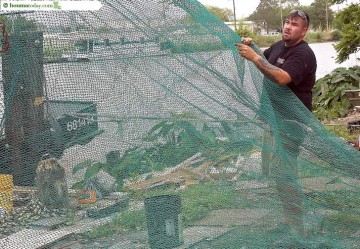 LDWF biologist Jeff Marx told the Shrimp Task Force Wednesday in Houma that while he doesn’t have the data to make predictions on how the upcoming season will unfold, he can show parallels to previous years. That leads to the conclusion that this year’s season has the characteristics of 2015, which was a hot year. Marx said small shrimp aren’t being seen in the basins yet. “It’s a good spread, but things change. If we get a big influx of small shrimp, it changes things. There’s a big difference between a cold year and what’s going on this year,” he said. Two things worth keeping an eye on are the “huge discharge” of water from the Mississippi River in the early parts of the year and the salinity levels. Read the rest here 08:31
LDWF biologist Jeff Marx told the Shrimp Task Force Wednesday in Houma that while he doesn’t have the data to make predictions on how the upcoming season will unfold, he can show parallels to previous years. That leads to the conclusion that this year’s season has the characteristics of 2015, which was a hot year. Marx said small shrimp aren’t being seen in the basins yet. “It’s a good spread, but things change. If we get a big influx of small shrimp, it changes things. There’s a big difference between a cold year and what’s going on this year,” he said. Two things worth keeping an eye on are the “huge discharge” of water from the Mississippi River in the early parts of the year and the salinity levels. Read the rest here 08:31
Mid Atlantic Council Approves Changes to Scup Gear-Restricted Areas
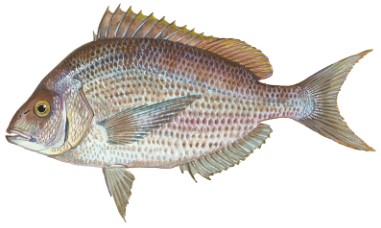 During a meeting in Montauk, New York the Mid-Atlantic Fishery Management Council approved a framework action to modify the boundary of one of the region’s two Scup Gear Restricted Areas (GRAs). The proposed change to the Southern Scup GRA boundary is expected to increase the availability of longfin squid to small-mesh fisheries. The GRAs were implemented in 2000 and are intended to reduce discard mortality of juvenile scup. The current GRA regulations include a Northern GRA, which is effective from November 1 through December 31, and a Southern GRA, which is effective from January 1 through March 15. Trawl vessels which fish for or possess longfin squid, black sea bass, or silver hake (also known as whiting) are required to use mesh 5 inches or larger in the GRAs during those times of the year. Read the rest here 07:40
During a meeting in Montauk, New York the Mid-Atlantic Fishery Management Council approved a framework action to modify the boundary of one of the region’s two Scup Gear Restricted Areas (GRAs). The proposed change to the Southern Scup GRA boundary is expected to increase the availability of longfin squid to small-mesh fisheries. The GRAs were implemented in 2000 and are intended to reduce discard mortality of juvenile scup. The current GRA regulations include a Northern GRA, which is effective from November 1 through December 31, and a Southern GRA, which is effective from January 1 through March 15. Trawl vessels which fish for or possess longfin squid, black sea bass, or silver hake (also known as whiting) are required to use mesh 5 inches or larger in the GRAs during those times of the year. Read the rest here 07:40
U.S. fisheries continue to rebuild; number of overfished stocks remains near all-time low
 Total number of rebuilt U.S. marine fish stocks since 2000 rises to 39. The number of domestic fish stocks listed as overfished or subject to overfishing remain near all-time lows, according to the report to Congress. Click here to view> The 2015 report highlights the United States’ continued progress towards managing fish stocks sustainably. This is a result of the combined efforts of NOAA Fisheries, commercial and recreational fishermen, the regional fishery management councils, states, and other partners. In 2015, eight stocks came off the overfishing list. 07:31
Total number of rebuilt U.S. marine fish stocks since 2000 rises to 39. The number of domestic fish stocks listed as overfished or subject to overfishing remain near all-time lows, according to the report to Congress. Click here to view> The 2015 report highlights the United States’ continued progress towards managing fish stocks sustainably. This is a result of the combined efforts of NOAA Fisheries, commercial and recreational fishermen, the regional fishery management councils, states, and other partners. In 2015, eight stocks came off the overfishing list. 07:31

































